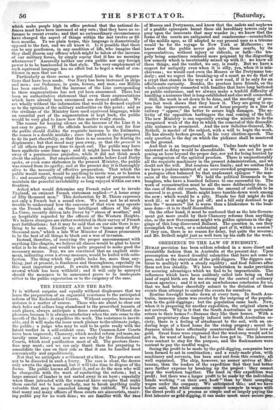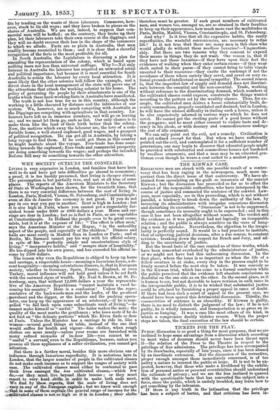OBEDIENCE TO THE LAW OF NECESSITY.
HIIK&N prevision has been seldom rebuked in a more direct and irresistible fashion than in Australia at the present day. -Upon presumption we feared dreadful calamities that have not come to pass, such as the starvation of the gold-diggers. The diggers con- tinue to multiply with a steady rapidity ; and food follows after them not less steadily. We have undertaken to make provision for securing advantages which we find to be impracticable. The influences which have been suddenly called into being on that land of rapid birth are far too strong for the control of ordinary human agencies ; and it is not an unwholesome conclusion for us, that we had better cheerfully submit to the dictation of those events than attempt to control the events for ourselves.
Routine foresight breaks down at every turn. In South Aus- tralia, immense alarm was created by the outgoing of the popula- tion to the gold-diggings ; but the population came back. Now, when it is preparing for another expedition, the original alarm is not revived. Why is it that the South Australians in particular return to their homes P—Because they like their homes. With a small proprietary class largely infused into South Australian so- ciety, there is a feeling of attachment to the soil, with an en- during hope of a fixed home for the rising progeny ; moral in- fluences which have effectually countervailed the sacred love of gold. Great fears were expressed that the wool-crop would not be got in, for want of hands; but it has been got in. The labourers were content to stay for the purpose, and the flockmasters were content to pay the needful wages. Seeing the profit to be made by the gold-digging, companies have been formed to act in combination; and a ready-made plan, with machinery and servants, has been sent out from this country, all well organized. The ship, however, no sooner arrives at Mel- bourne, than the leaders of the expedition find they had better save further expense by breaking up the project : they cannot keep the workmen together. The bond in this expedition was profit; but there was a larger profit to be made by the individual hands working "on their own hook " than by their accepting wages under the company. We anticipated this ; and we have before said, that while commerce cannot compete in wages with the direct profit of a process so simple and so largely paying the first labourer as gold-digging, it can make much more secure pro.;
fits by tending on the wants of those labourers. Commerce, how- ever, stuck to its old ways; and they have broken to pieces on the shores of Australia. We are not, indeed, to suppose that com- mercial men will be baffled; on the contrary, they broke up,their plan, let their labourers take their own course at the diggings, and they will no doubt recover their loss in the shape of the commerce to which we allude. Facts are so plain in Australia, that men readily become reconciled to them ; and it is clear that a cheerful recognition of the facts is the most profitable for all.
In South Australia the Legislature is discussing a plan for amending the representation of the colony, which is based upon nothing more nor less than universal suffrage. Why P—Not only because in Australia the labourer has acquired an unwonted sonial and political importance, but because it is most essential for South Australia to retain the labourer by every local attraction. It is most likely that the other colonies will follow the example, and a direct share in the local management of the state will prove one of the attractions that attach the working. colonist to his home. The policy of governing the people by their attachments is one of the truths which these hard-working facts in Australia have manifested. The truth is not less true for us in this country, although the working is a little obscured by distance and the intricacies of our system. We, however, are as much competing with Australia as the Diggings are competing with agriculture in that country. La- bourers have left us in immense numbers, and will go on leaving us ; and we must let them go' such as list. Our only chance is to make them like the land of their birth better than the colony. Now, the motives which sway the labourer are, the love of a com- fortable home, a well-stored cupboard, good wages and a prospect of political recognition. He can get all in Australia, by taking a long voyage to find them. If he could get them in this country he might hesitate about the voyage. Free-trade has done some- thing towards the cupboard ; Free-trade and commercial prosperity are doing something towards the wages • and perhaps the intended Reform Bill may do something towards the other attraction.

























 Previous page
Previous page